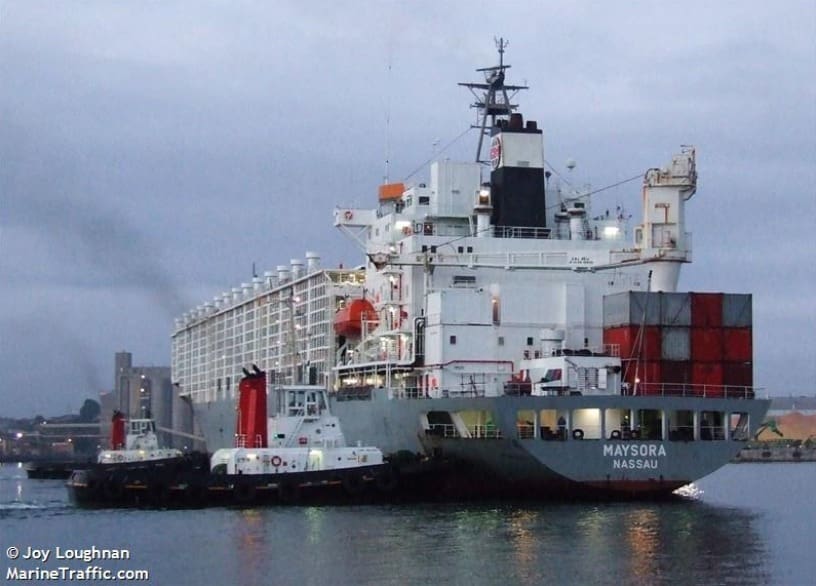
The twin-tiered livestock vessel the MV Maysora.

Deputy Prime Minister Michael McCormack
DEPUTY Prime Minister Michael McCormack has indicated he won’t reconsider a government decision to consider exemptions for twin-tiered live sheep export vessels.
A spokesperson for Mr McCormack, the Minister for Infrastructure,Transport and Regional Development, told Sheep Central the Federal Government remained committed to phasing out twin-tier vessels, but did not disclose a new deadline.
“In the interim, to assist farmers, exporters and vessel owners, the government will consider potential exemptions for twin-tier vessels used to export live sheep.
“Any exemption would be temporary, limited and assessed on a case-by-case basis,” the spokesperson said.
Following sheep losses on two-tiered vessels, former Agriculture Minister David Littleproud committed to phasing out the twin-tier vessels by 1 January 2020. However, the government recently confirmed it will consider potential exemptions from requirements under Marine Order 43 (Cargo and cargo handling – livestock) 2018 for twin-tier vessels used to export live sheep, allowing them to operate beyond 1 January 2020.
RSPCA urges McCormack to reconsider
The backflip has been criticised by RSPCA Australia and live exporter Wellard, while being welcomed by twin-tier vessel owners Livestock Shipping Services (the MV Maysora) and Kuwait Livestock Transport and Trading (Al Shuwaikh).
RSPCA Australia is urging Mr McCormack to reconsider the decision, which it said defied common sense and represented a slide back to the days of complacent live export regulation.
“The animal welfare consequences of this decision are profound, while the economic advantages are so limited.
“It really makes no sense whichever way you look at it,” RSPCA senior policy officer Dr Jed Goodfellow said.
“When these proposed changes were opened up to consultation in June 2018, thousands of Australians (over 7000 through the RSPCA alone) made submissions in support of the phase-out.
“And yet, despite clear evidence from the Australian Maritime Safety Authority – including a minimal impact on shipping capacity – it appears the Morrison Government is intent on allowing these floating rust buckets to continue transporting Australian sheep,” he said.
“What does this say about the Morrison Government’s commitment to protecting animal welfare, and just as importantly, their ability to effectively manage these rogue live export companies?
“This is precisely the kind of poor decision-making that led to the current live export crisis and turned hundreds of thousands of Australians into advocates against this cruel trade, as they grew ever more infuriated by the government’s inaction while countless animals suffered over decades,” Mr Goodfellow said.
The RSPCA said officials from the Australian Maritime Safety Authority advised a Senate Estimates Committee in November 2019 that the twin-tier vessel phase-out was necessary because the vessels obstruct air flow and ventilation across pens, and make it almost impossible to visibly inspect sheep and access sick or injured animals, contrary to the applicable marine orders.
Vessel owners need to submit Marine Order 43 compliance plan
Mr McCormack’s spokesperson said owners of twin-tiered live export vessels would be applying for a temporary exemption from deck height and ventilation requirements legislated under Marine Order 43.
“Vessel owners would need to justify why they are unable to meet the requirements of Marine Order 43 and submit a plan to meet the requirements as soon as practicable.
“As a condition of any exemption granted, exporters who use these vessels to export live sheep would need to have an approved management plan to support acceptable animal welfare outcomes,” the spokesperson said.
“This plan would need to address the constraints posed by these vessels, such as reduced ventilation, as well as the difficulty in observing the stock and removing sick animals.
“The plan would need to be assessed as appropriate for achieving acceptable animal welfare outcomes by the Department of Agriculture.”
Animal welfare is a priority
When asked if Mr McCormack is concerned that allowing twin-tiered vessels to operate might lead to a further mortality incident and bring the industry into disrepute, his spokesperson said the Federal Government took animal welfare seriously.
“It is a priority and as such it would be a condition of any exemption to have an approved management plan to support acceptable animal welfare outcomes agreed with the Department of Agriculture.”
When asked if Mr McCormack is prepared to reconsider the decision to allow exemptions, the spokesperson said: “This is not government policy.
“The Australian Government has decided it will consider on a case-by-case basis temporary and limited exemptions from the requirements under Marine Order 43 for twin-tier vessels used to export live sheep.”

This is disgraceful. Wake up, minister.
I am astounded at the idea as apparent with the thought pattern of Minister McCormack that a twin-tier vessel will have better conditions; so good that monitoring would not be necessary.
Wake up Minister, reality is that this is a vessel for animals to be crowded onto, we have seen the way that the animals are treated on these ships, two deck or twenty decks — it does not matter — all ships need to be monitored on every voyage.